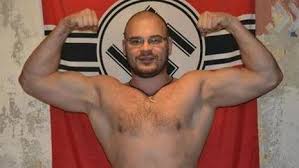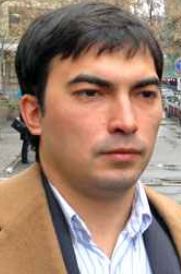
Cuba arrests Russian neofascist at Interpol’s request
Havana police on Friday (Jan. 17) arrested a Russian neofascist who was sought by Interpol, the Russian Interior Ministry announced Saturday (Jan. 18). The wanted man, Maxim Martsinkevich, will be repatriated to his homeland.
Martsinkevich, known as “Tesak” (“Cutlass” or “Machete”), is notorious in Russia because he leads a neo-Nazi gang that persecutes homosexuals and Central Asian immigrants. He was charged last Dec. 13 by a Moscow District Court under Article 282 of the Russian criminal code, which forbids “the incitement of hatred or enmity, and the humiliation of human dignity with violence.”
In videos uploaded to YouTube by his organization, Martsinkevich urges the deportation of Central Asians from Russia, accusing them of being criminals.
“Machete” was arrested in a Havana hotel where he was staying, the Russian TV station Life News reported Saturday. His cell phone and laptop computer were seized. The report did not say how long he had been in Cuba.
According to a spokeswoman at the Kuntsevo Court, which asked for Interpol’s assistance, Martsinkevich had refused to return voluntarily to Russia, saying that, if hunted, “he would go to the mountains [of Cuba] and eat beans and shrimp.”
Maxim Martsinkevich was born on June 8, 1984. According to the Moscow prosecutor’s office, in 2007 he was a student at the Moscow State Construction University, where he was known for his racist remarks.
Then he became a member of the People’s National Party, an ultra-rightist organization, and created a group of “skinheads” called Format 18, which was banned as extremist.

“Machete” was sentenced to three-and-a-half years’ imprisonment in 2008 for inciting hatred, but served only two years. He was released on Dec. 31, 2010, court records show.
He then organized a group that called itself “Occupy Pedophilia,” which used violence against homosexuals and pedophiles. That movement spread to Ukraine, Belarus, Kazakhstan, the Baltic and even Barcelona, Spain.
Martsinkevich is also sought in Belarus under Article 339 of the criminal code, which prohibits “hooliganism committed with a weapon.”
As of noon Saturday, the Cuban media had not reported on Martsinkevich’s arrest.
**********
Fugitive’s extradition might be difficult, his lawyer says

Matvei Tsen, an attorney who has represented Maxim Martsinkevich in previous court appearances, told the ITAR-TASS news agency that extraditing his client from Cuba will be difficult because the criminal codes of Russia and Cuba are different.
“As far as I could research Cuban laws, they have no equivalent of [Russia’s] Article 282, which prohibits ‘inciting hatred or enmity toward a social group with violence or the threat of force,'” the attorney said.
Extradition is possible only when the accused has committed a crime in his country of origin that is similar to a crime punishable in the host country, he explained.
“The closest equivalent of Article 282 in the Cuban code is ‘anti-Soviet activity,’ and I doubt that he will be charged with that,” Tsen said.
The next step is for Russia to submit to Cuba a formal request for extradition.
“I do not rule out that Martsinkevich asked for political asylum in Cuba,” Tsen said. “The Russian authorities must prove that he will be tried in Moscow for a criminal offense not connected with politics.”

